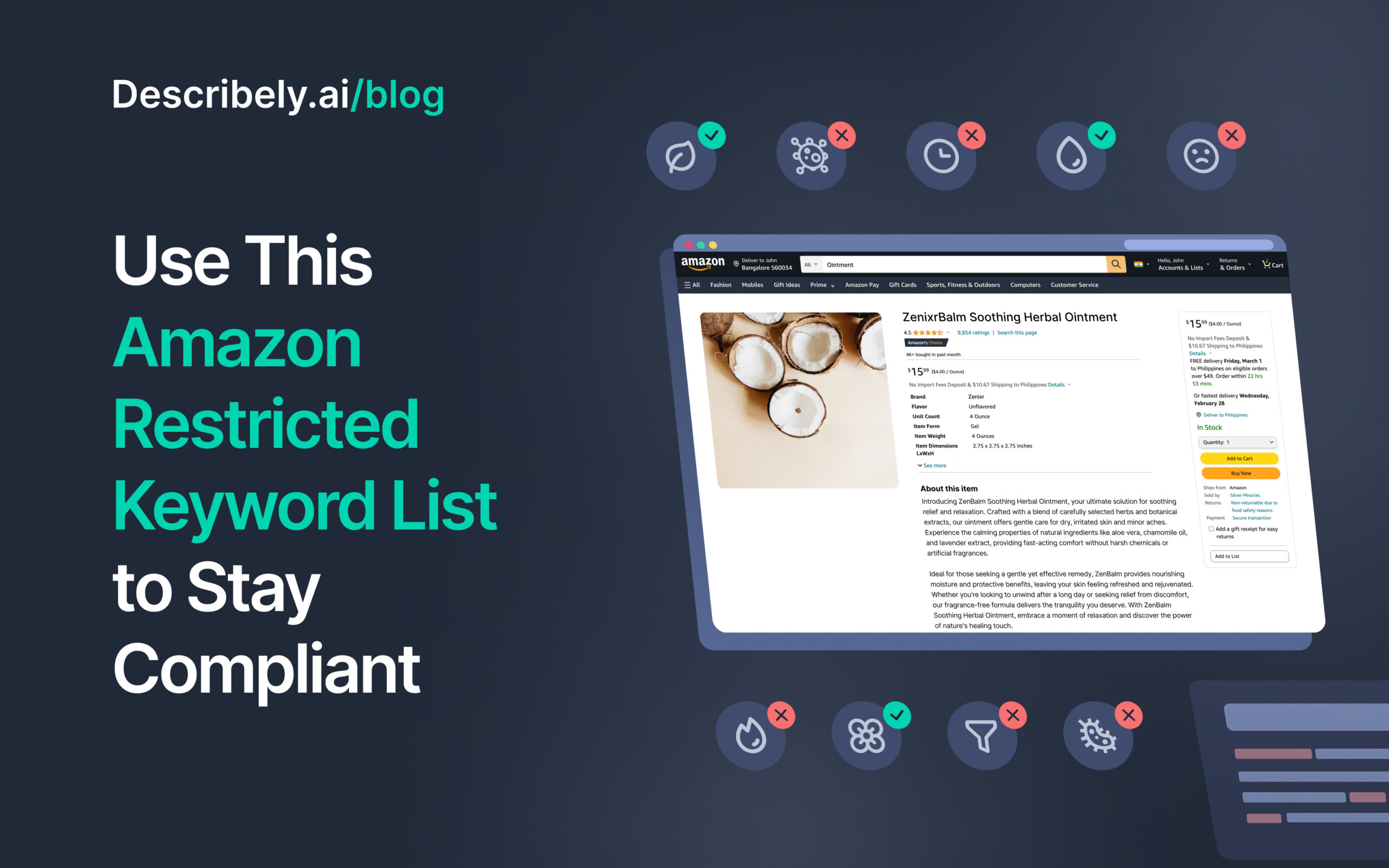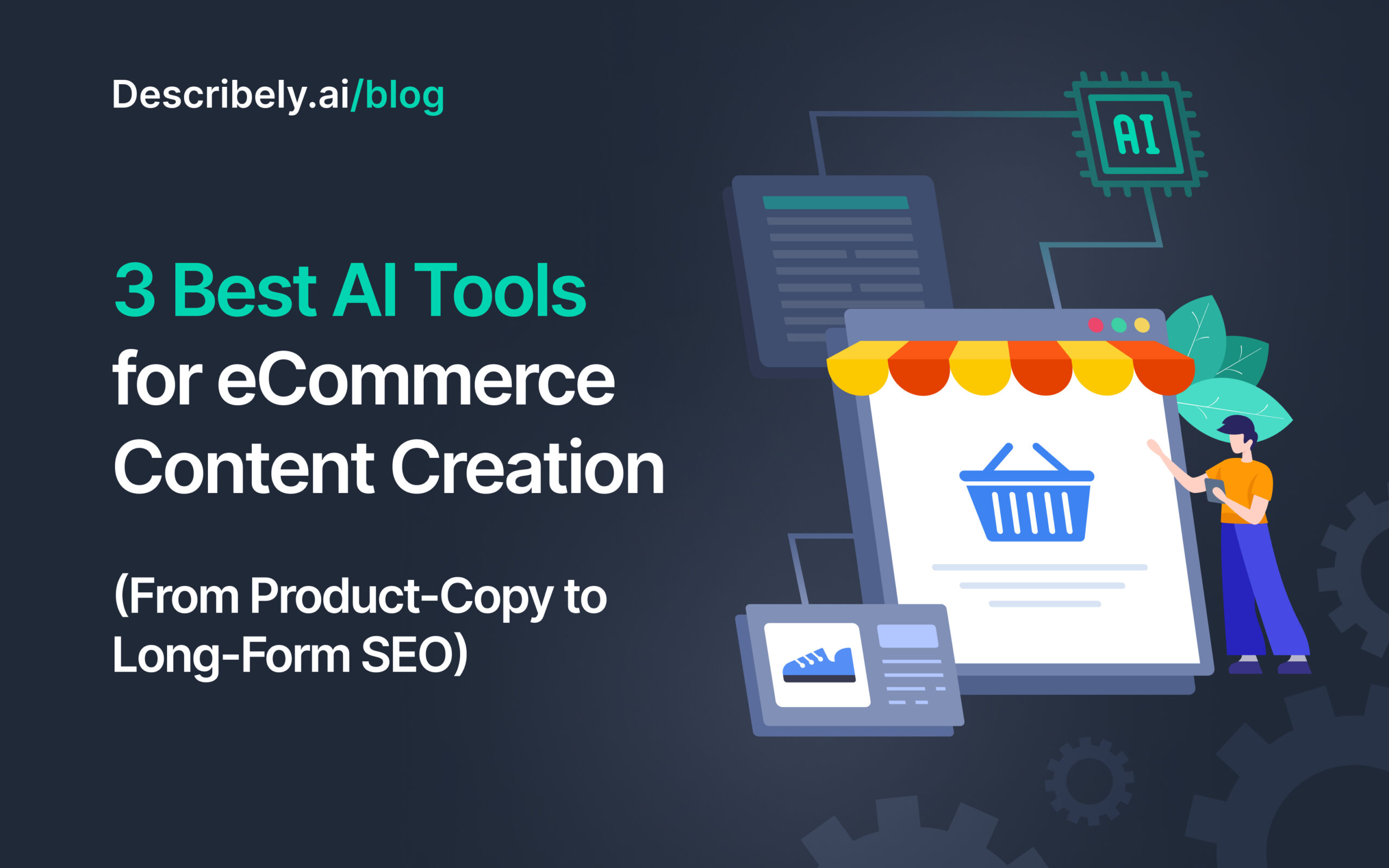
3 Best AI Tools for eCommerce Content Creation (From Product-Copy to Long-Form SEO)
If we were to take a wild guess, here’s probably where you’re at in your journey: You’ve heard a lot about AI writing tools and want to use them for your eCommerce business, but there are tons of options in the market, so you don’t really know which one is beneficial to you based on your use case.
It could also be that tools like ChatGPT and Bard are not cutting it anymore, mainly because you’re looking for something more eCommerce-focused.
Well, if we’re right on all accounts, then you’ve landed in the right place. In this post, we’re not going to spoil you with choices. Instead, we’re going to focus on the top three AI writing tools every eCommerce business needs (don’t worry — we’ll be focused on how all of these tools can meet your eCommerce use cases).
And on that note, if you’d like to begin using one of the tools, Describely, then here’s where you can sign up for free. If not, then let’s dive directly into the piece.
What should you look for in an eCommerce AI writing tool?
Before we move forward, it’s extremely important to mention your requirements and use cases play an important factor in deciding what to look for in an AI writing tool. The right answer for you may very well not be the right answer for someone else.
But, if you’re on the search for writing tools with AI to help drive traffic for your eCommerce website, ideally, look for one that can:
- Generate content keeping your brand tone and style in mind.
- Be intuitive and easy to use (look for tools with excellent reviews).
- Integrate keywords to make your content SEO-friendly.
- Help you manage your workflows and files easily.
- Generate accurate content that doesn’t require constant edits/rewrites.
And while the requirement list might look minor, you’ll be surprised to know that not all eCommerce AI tools in the market can checkmark the aforementioned pointers.
Having said that, when there’s demand, there’s supply, and there are a few well-established tools in the market to meet the demand of your unique requirements (ones that can also tick all the above pointers) —- some of these tools are more suited towards long-form content, whereas others are more geared towards writing meta content and product descriptions.
We’re taking the next section to discuss which AI writing tool to pair with which writing needs.
1. Describely: Best for product-focused content like product descriptions
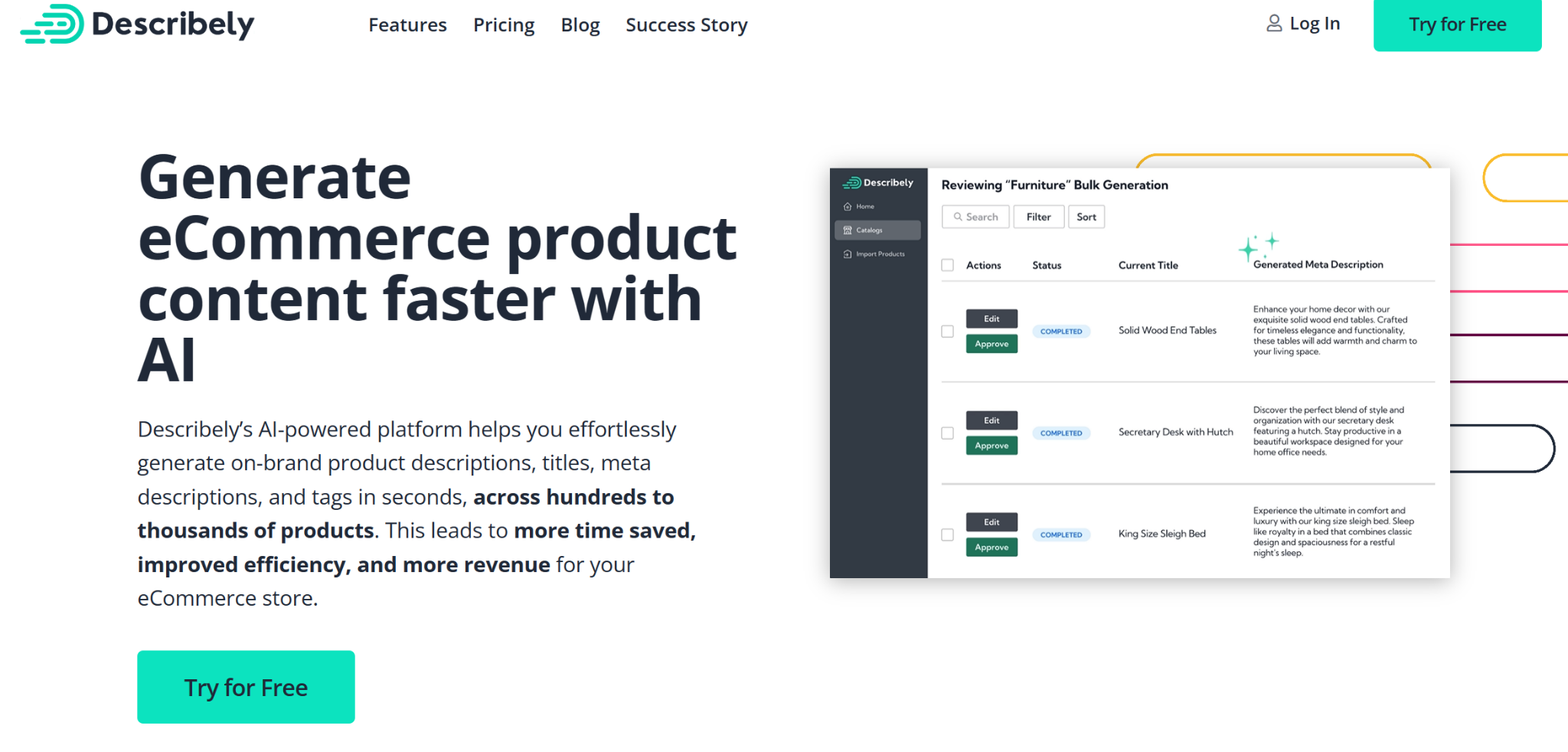
If you’ve resorted to paying hefty money to write, edit, and update product descriptions, or if you’ve used the same sparse details your suppliers have given you, or, rather, you’ve copy-pasted product content from competitor websites, you can’t go wrong with Describely.
Why do we make this bold statement? Mainly because Describley is one of the few AI writing tools in the market that is specifically designed for the eCommerce industry, and you can leverage it to write, edit, and update product descriptions and meta content in bulk.
Think about all the same products you offer in different specifications (e.g., black T-shirt with V neck vs. black T-shirt with U neck or the same dress in different colors) —- all these minute details can be updated with the help of Describely’s AI.
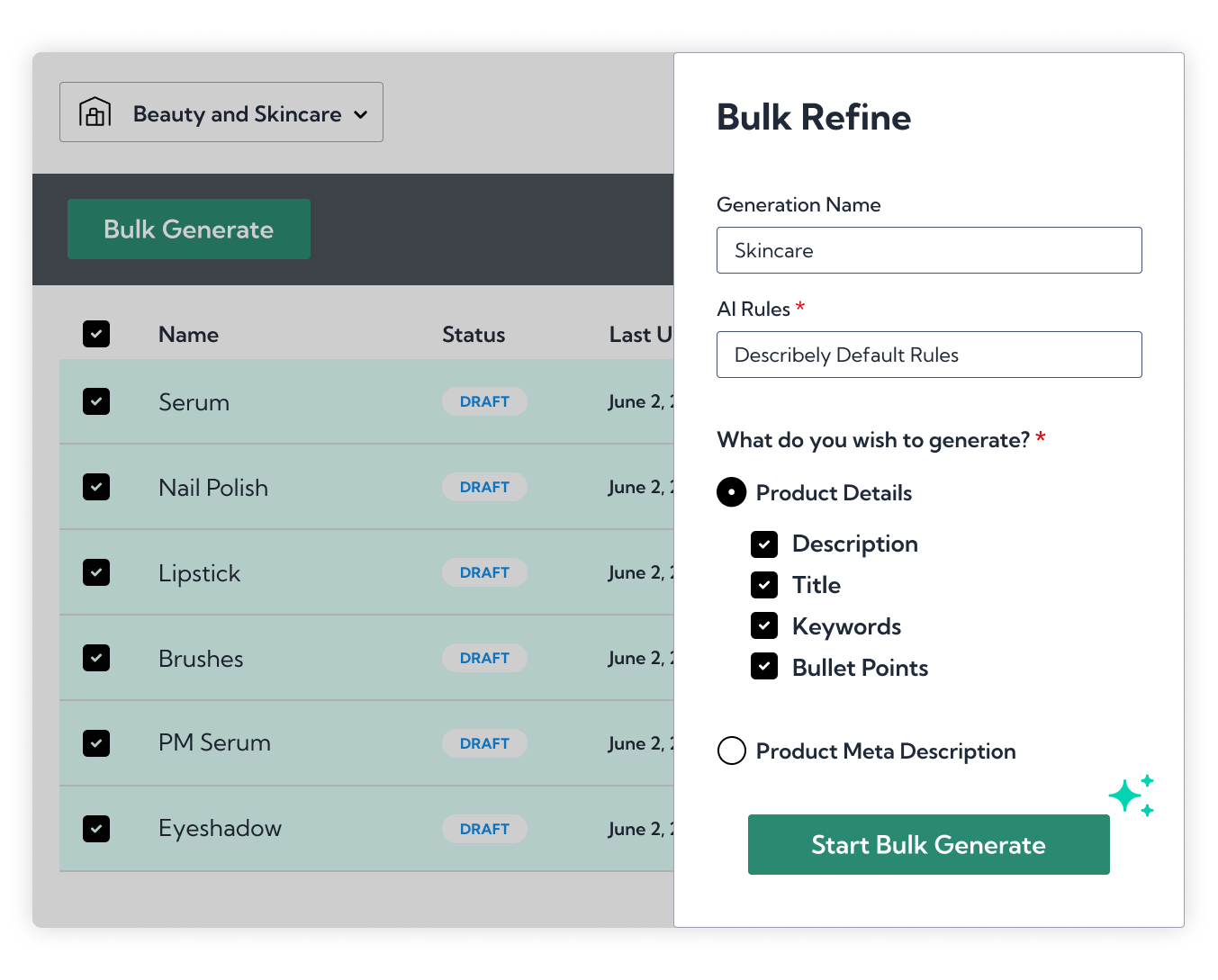
Describely also integrates with your eCommerce stores on different platforms, including Shopify, Squarespace, and Salsify, allowing you to update all your details directly from the same software.
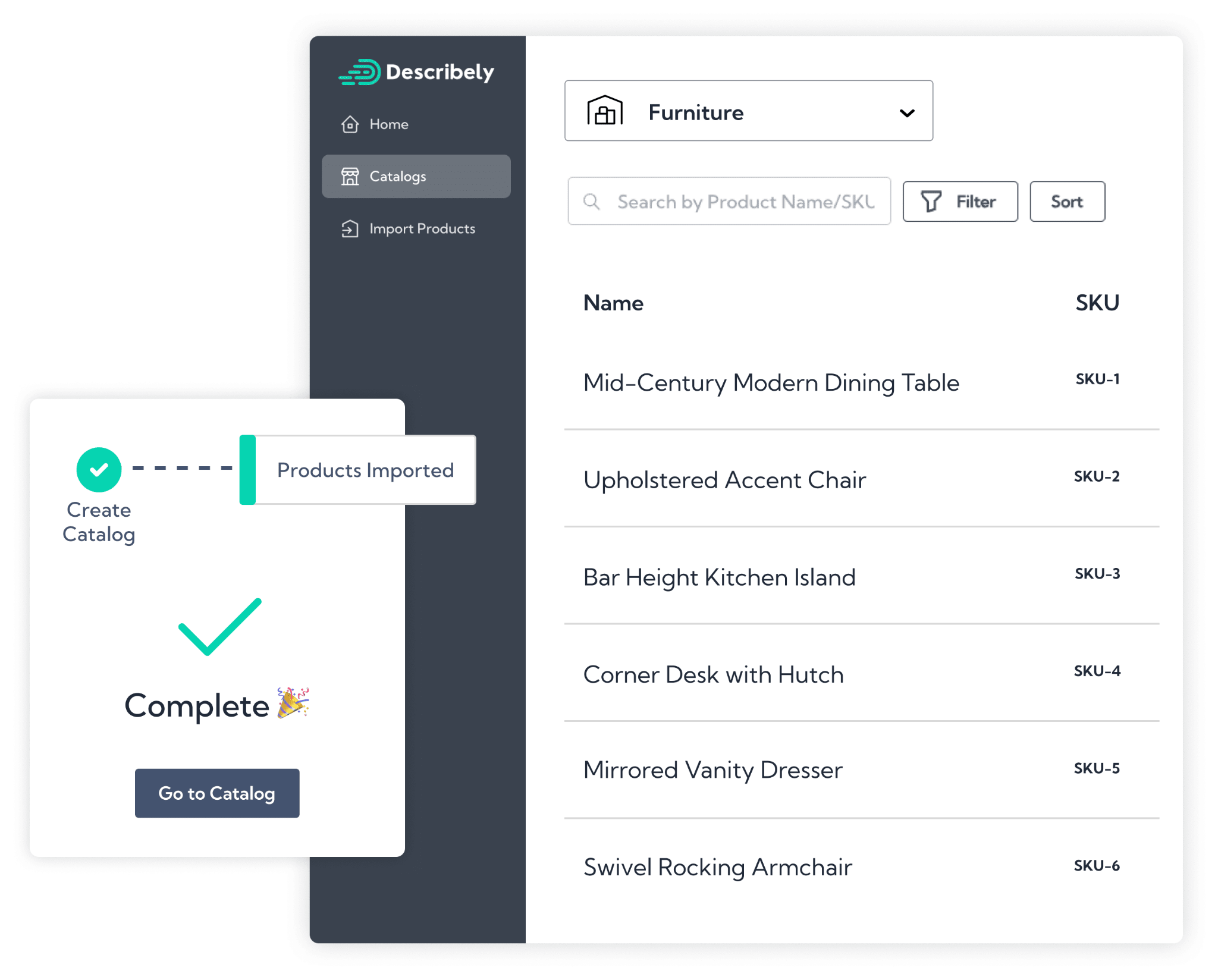
Moreover, you can even leverage Describley to:
- Find relevant keywords based on your product name and integrate those keywords seamlessly within your product descriptions.
- Organize your product data with the help of catalogs (you can manually create your own catalog on Describley or import your data).
- Keep track of product content with the help of status updates, version history, and assignment of tasks to team members.
- Bulk generate content for thousands of products. You can ask Describely to write these descriptions from scratch or enrich existing product details with limited information in bulk.
- Develop meta titles, meta descriptions, tags, and HTML data (it’ll even show you scores based on how SEO-optimized your metadata is).
- Update descriptions keeping your brand voice and tone in mind (you can choose a default AI rule set or create your own rule set).
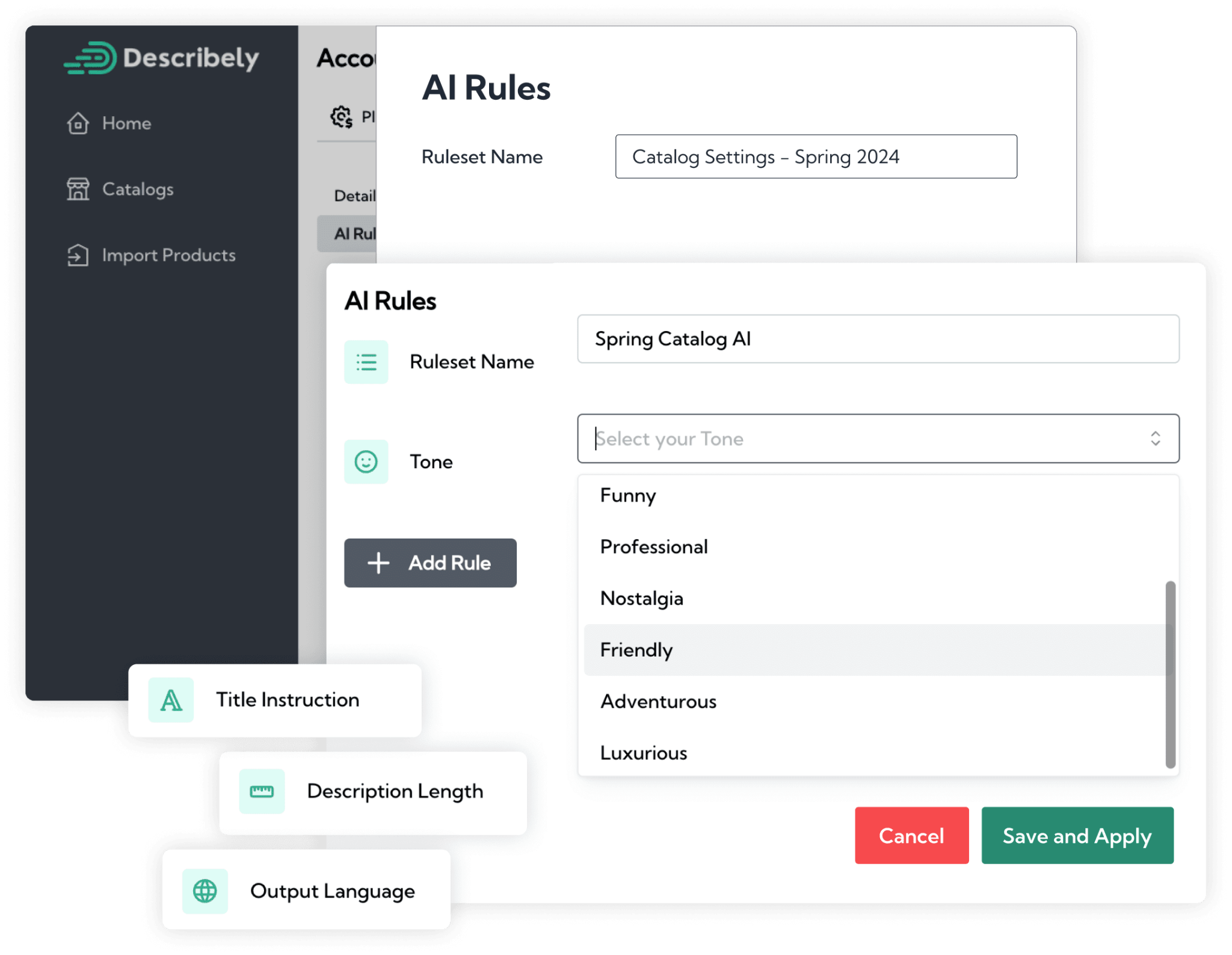
If that sounds like an impressive feature list to you, then here’s where you can sign up for Describely!
User Reviews
Since Describely is still new to the market, we haven’t been reviewed on many peer-to-peer review sites (the only peer-to-peer site that reviewed us was Capterra, and we had a rating of 4/5 there).
We’ve also received tons of positive feedback from individual review sites (see reference below) as well as customers (take a look at this case study to see what folks at Target Australia have to say about our product).
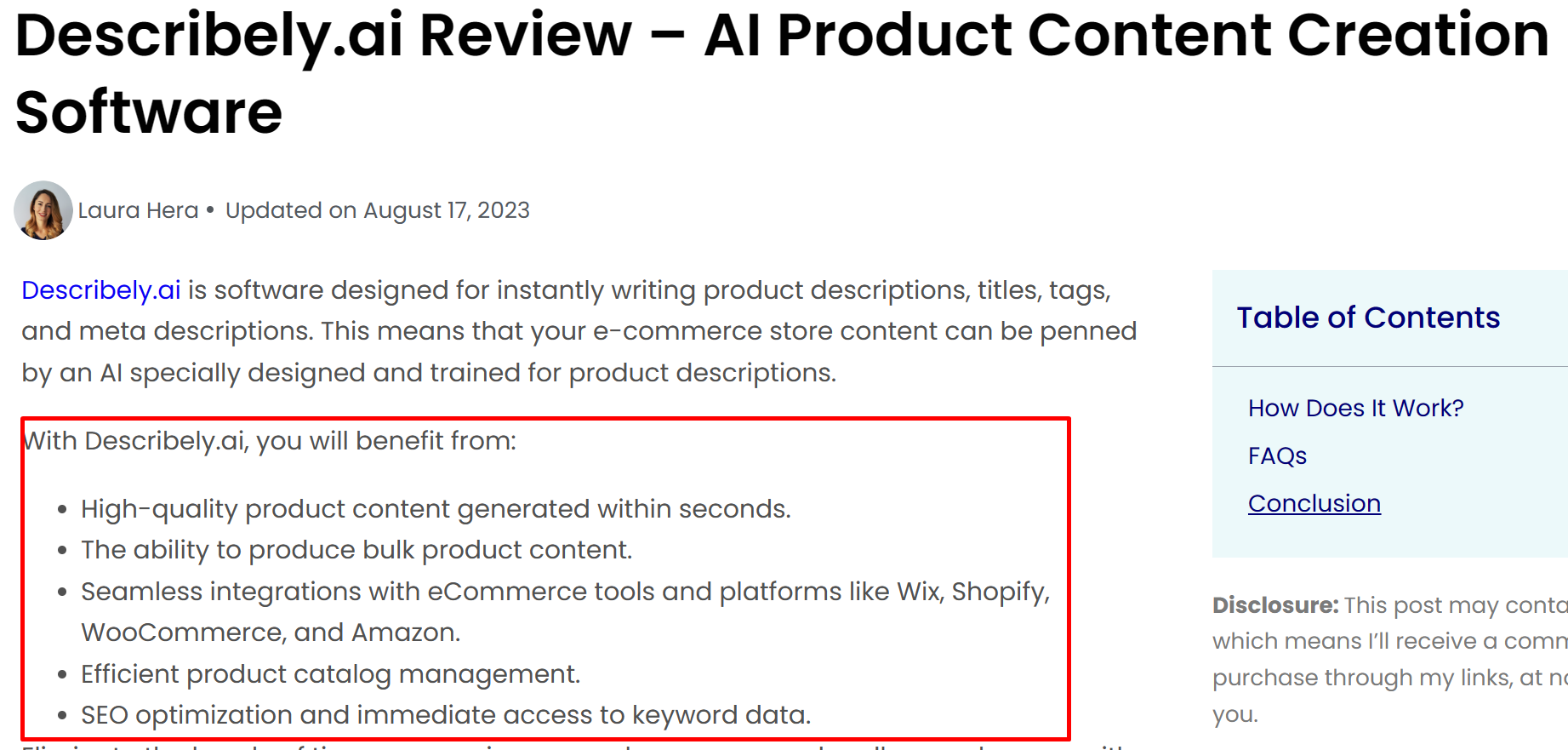
2. Frase.io: Best for long-form eCommerce SEO-blog content
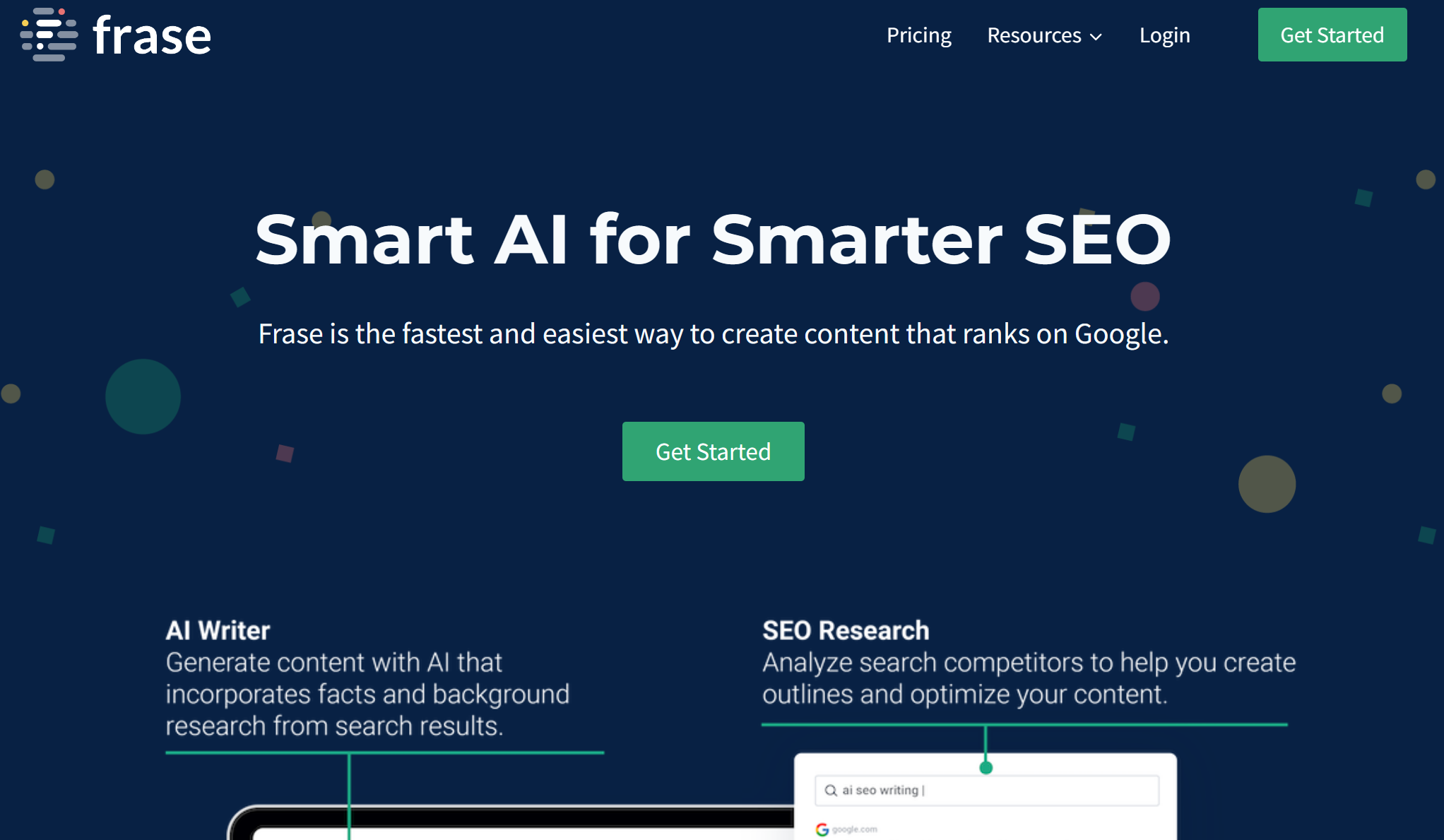
While you might have heard of Frase in passing, you’d be surprised to know it’s one of the first SEO research and AI writing tools to ever exist, which gives it leverage above others because it’s got to know the SEO writing space for longer and has had more time to do experiments, research, and development.
Having said that, there are multiple AI-writing tools in the market, so what makes Frase special? Well, its shining USP is that it’s one of the few SEO solutions that can do SEO research for you and also create SEO content (like articles and guides) after analyzing the top-performing articles on SERP (search engine results page).
If you contrast it with names like Clearscope, the latter doesn’t offer the same benefit — aka, Clearscope can help you optimize content but cannot write content completely from scratch.
However, let’s focus on eCommerce content creation specifically. If you’re someone who writes content for eCommerce companies, Frase can help you with the following scenarios:
- Content Creation: You can use Frase to write new SEO blog content or optimize existing content. It’ll create a suggested brief or outline based on the topic you provide, and will show you the number of words and headings you should be aiming for.
- Content Research: Frase not only analyzes SERP results but also factors in results from other resources like People Also Ask, Quora, and Reddit (you can use the questions from here for your FAQs).
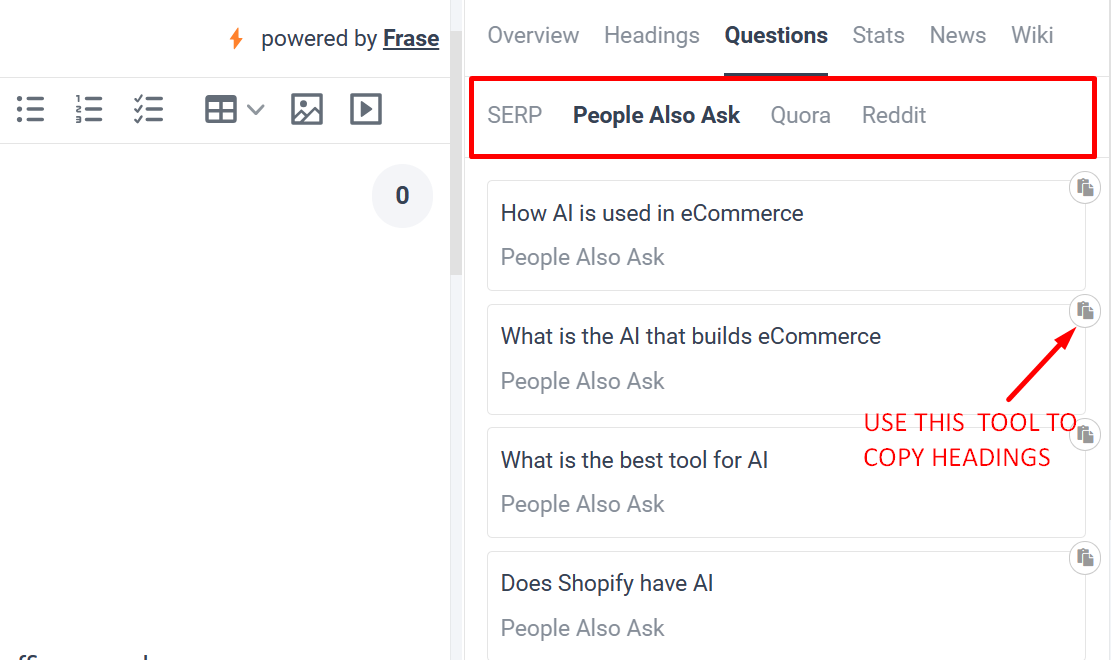
- Research Citation: The solution allows you to copy content (e.g., quotes) and cite the correct source. It even has separate headings to show you the trending stats, news, and wiki articles based on your query, so content research and citing sources becomes all the more easier.
- Competitor Research: Aside from showing you the ideal amount of words, headings, and images you should be aiming for, Frase will also show the number of links you should aim for based on SERP results, the number of backlinks your competitors incorporated, and what their domain rating (DR) looks like.
- Brand Guidelines Incorporation: You can provide Frase with high-level instructions (e.g., your brand guidelines, tone, topics you want to cover, etc.) and ask its AI to create long-form content for you.
- SEO Content Optimization: It will show you the keywords you should be targeting in the order of importance. You can even refine Frase to show results based on different languages (e.g., if you want to rank for keywords in French, you can ask it to search for SERP results for that language).

Frase is one of the best AI solutions for long-form eCommerce blog content due to the amount of proof provided, and if you’d like to leverage it for your business, all you need to do is sign up for a trial!
User Reviews
Frase received an aggregate rating of 4.8/5 on G2 based on 294 reviews. It also received the same rating (4.8/5) on Capterra based on 332 reviews.
3. Rytr.me: Best for short-form website content
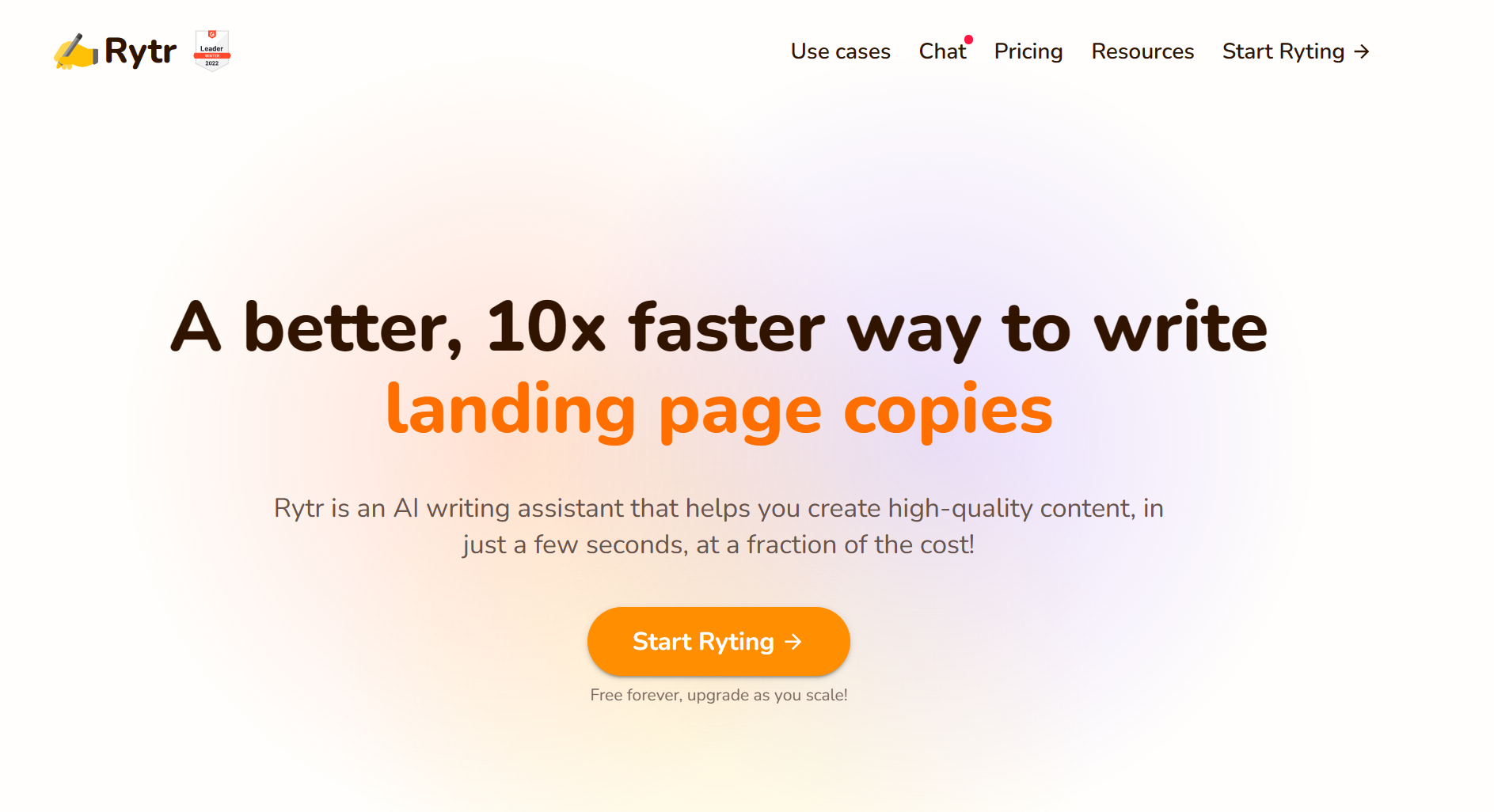
Trusted by more than 7 million customers, Rytr is one of those AI writing tools most of us can’t do without, mainly because it can help with any and every kind of content.
That’s to say, regardless if you’ve got a requirement for an eCommerce business idea pitch, copywriting framework, emails, product ads, job descriptions, landing pages, website copy, or story plots —- Rytr is like that trusted freelancer that can write it all (it presently caters to 40+ use cases)!
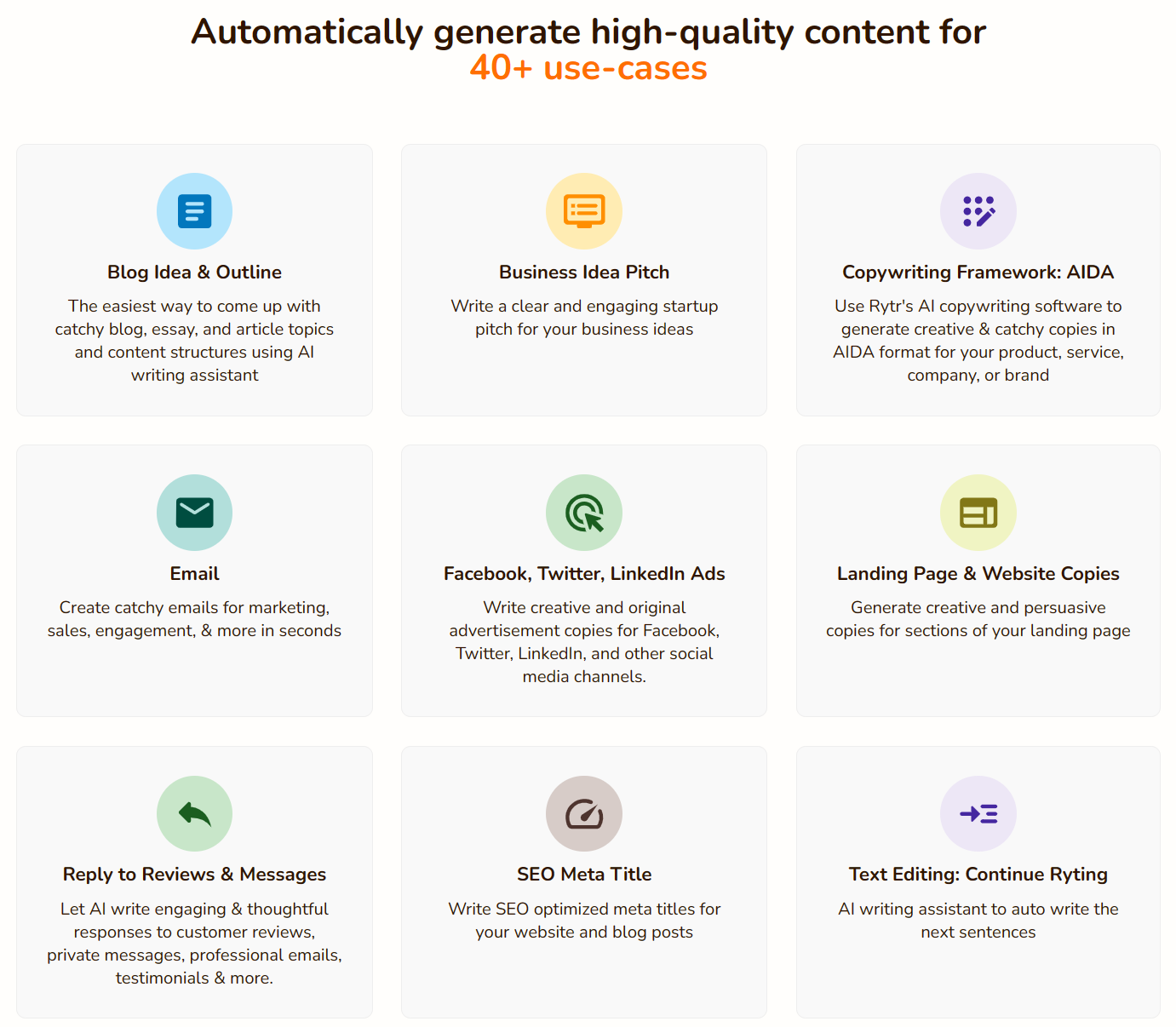
But that’s just the start of it. Here are a few more features that make freelancers love this platform:
- Personalized Content Curation: Rytr can adapt content while keeping 20+ tone preferences in mind and also write in more than 30 languages. If you’ve got custom use cases around your products (except for those mentioned above), it can create content for those scenarios too. Not only that, Rytr is also highly affordable and extremely easy to use.
- Add-on Features for Ease of Use: Aside from its ability to create short-form content, Rytr’s also got a premium plagiarism checker, an AI-backed image generator, an active community, and multiple self-serve support resources you can leverage.
You can even integrate the solution with your browsers and everyday social media and communication tools to create and publish content from one place.
- Content Variations and Edits: You can ask Rytr to refine different headings, paragraphs, and sentences based on your preference (you can also ask it to create multiple variants of content for the same keywords). It doesn’t need more than a simple topic or prompt to begin writing, and you can also directly manually edit and manage your documents from Rytr.
- SEO Optimization: Rytr can sprinkle your content with keywords to make it SEO-friendly. Its AI has also been trained with tons of SEO-friendly articles, so it structures new content pieces keeping SEO best practices in mind.

Even having said all of this, we still haven’t touched upon all of Rytr’s features. To learn more about its features and benefits, click here.
User Reviews
Rytr has received a rating of 4.7/5 on G2 based on 784 reviews and a rating of 4.8/5 on Trustpilot based on 2,332 reviews.
Summary and next steps re: best AI tools for eCommerce
As far as AI tools for eCommerce are concerned, the solution you end up choosing depends on your needs.
As a quick summary, here’s what we discussed:
Describely is best for generating your eCommerce product descriptions in bulk or enriching descriptions with sparse details.
Frase is best if you need to write long-form SEO-optimized content for your eCommerce store, for example, a Shopify blog.
Rytr is best if you need to write short-form content such as sales emails for your eCommerce store or landing page content.
If you wish to explore the capabilities of any of these AI-powered writing tools in person, you can sign up for Describley here, sign up for Frase here, and sign up for Rytr here.


